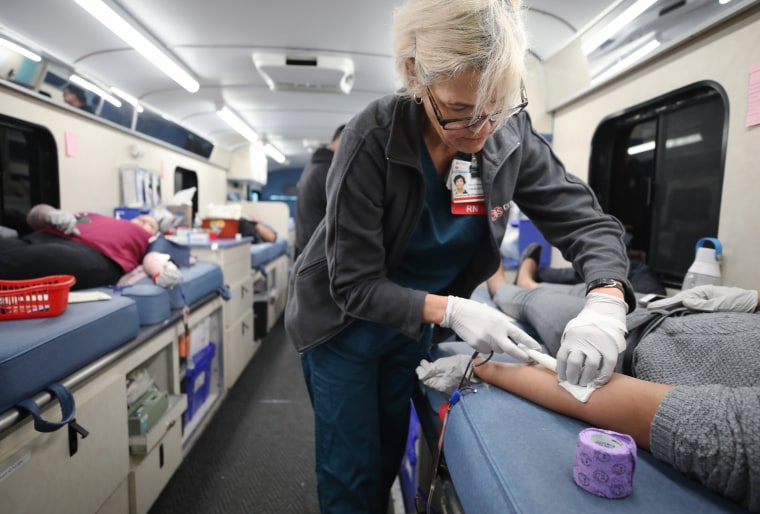LGBTQ advocates are calling on the U.S. government to allow gay and bisexual men to give lifesaving blood without restriction to address donation shortages amid the global outbreak of COVID-19, the disease caused by the coronavirus.
Last week, the nationwide nonprofit GLAAD launched a petition claiming the current policy set in place by the Food and Drug Administration, which mandates that men who have sex with men abstain from sexual contact for 12 months prior to donation, is “antiquated” and “absurd.”
“The FDA needs to put science above stigma,” Sarah Kate Ellis, CEO and president of GLAAD, said in a statement. “Gay and bisexual men … want to give blood and should be able to contribute to help their fellow Americans.”
The petition was released after Surgeon General Jerome Adams called upon Americans to give blood following reports from the Red Cross that 2,700 blood drives had been canceled over the past month after the coronavirus began spreading across the United States. As of March 16, those cancellations had resulted in 86,000 fewer donations, potentially decimating the U.S. blood supply.
Full coverage of the coronavirus outbreak
In a briefing Thursday from President Donald Trump’s coronavirus task force, Adams called on “millennials and Gen Z” to make an impact, urging that “one donation can save up to three lives,” and saying, “blood centers are open now and in need of your donation.”
GLAAD Communications Director Mathew Lasky said it will be difficult for the LGBTQ population to respond to the blood shortage when so many of them remain unable to donate. Citing a September 2014 report from UCLA School of Law’s Williams Institute, a pro-LGBTQ think tank, he estimated there would be an “extra 600,000 pints of blood available per year” if the 12-month deferral period for gay and bisexual men were lifted.
“We really see it as a holdover of a discriminatory policy from a time long past,” Lasky told NBC News. “We think that it’s important to push the FDA to rethink the policy around this because it’s not based in current science.”
The current policy on gay and bisexual men — who represent nearly 70 percent of new HIV diagnoses — was instituted in 2015 after the FDA lifted the lifetime ban on such donations, which had been in place since 1983. The original policy was a holdover from the height of the HIV/AIDS crisis, when very little was known about the virus or how to test for it. Following decades of advocacy by LGBTQ groups, the U.S. government agreed to a 12-month deferral period — in line with blood policies in Australia and Ireland.
But critics said even that policy doesn’t reflect progress in screening and testing for HIV over the past four decades.
Jay Franzone, an LGBTQ advocate who remained abstinent for a year to donate blood in January 2017, said “nucleic acid amplification testing takes four to six days to detect the presence of HIV in somebody’s blood.”
“When I worked on this in the fall of 2014, I mentioned in a speech to the Department of Health and Human Services subcommittee that this antibody test for HIV used to take weeks,” Franzone said. “It went from weeks to under a week.”
In light of these advances, the American Red Cross issued a statement in November advising the FDA to move to a three-month deferral period for gay and bisexual donors “as a scientifically-based interim step” toward ending restrictions altogether.
“Blood donation eligibility should not be determined by methods that are based upon sexual orientation,” the disaster relief organization said.
Despite these pleas, the FDA signaled it is unwilling to change its donation requirements at the current time. In a statement to the LGBTQ newspaper Washington Blade, an FDA spokesperson said Thursday the department’s guidelines “have not changed” and said it would “continue to re-evaluate the situation as the outbreak progresses.”
Jason Cianciotto, the senior managing director of institutional development and strategy at Gay Men’s Health Crisis, said the FDA’s current guidelines will continue to perpetuate the false notion that HIV is a “gay disease,” even as other countries have successfully eliminated their deferral periods altogether. More than a dozen nations, including Argentina and Spain, have adopted a risk-based assessment in place of what he called a “de facto ban.”
Download the NBC News app for full coverage and alerts about the coronavirus outbreak
“The overwhelming majority of people aren’t going to be celibate for a year,” Cianciotto said, adding that risk-based screening is intended to focus on any “behavior you may have participated in that would put you at high risk for contracting HIV.”
A risk-based assessment, many believe, would help address lingering double standards in the blood donation process by putting gay and bisexual men on equal footing with straight men. When the lifetime deferral was lifted in 2015, out gay Colorado Gov. Jared Polis — then a congressman — told Reuters that it was a personal affront that a “married gay man in a monogamous relationship can’t give blood, but a promiscuous straight man who has had hundreds of opposite-sex partners in the last year can.”
Cianciotto added that changing FDA policies to match current scientific understanding about HIV/AIDS would mean a great deal to gay and bisexual men who have been turned away from blood donation centers for decades. When Cianciotto wasn’t allowed to donate during his high school blood drive as a teenager, it reinforced the message that “there was something inherently wrong and diseased” about LGBTQ people, he said.
“So many years later, we’re still perpetuating that same unscientific, stigmatizing message to youth, and that needs to change,” Cianciotto said.



